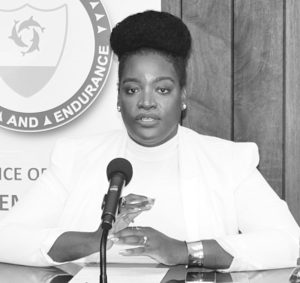
During the Government’s Press Conference on Monday, October 16th, the Hon. Minister of Sustainability, Innovation and Environment, Mrs. Quincia Gumbs-Marie, sought to clear the air with regard to an issue concerning fishing licenses.
Before she addressed the fishing license issue, however, she set the stage by reflecting on her work in certain areas of the agriculture sector.
“When I became Minister of Sustainability, Innovation and Environment,” she said, “I held a series of consultation meetings with farmers and fisher-folk, Nothing that I do is without endorsement from the people who would be directly affected. If you look at our track record in this Ministry you will find that we are people-focused and people-led.”
“My farmers indicated that they wanted to extend their growing season, so I was able to acquire shade-houses for them,” the Minister noted. “The farmers complained about the accessibility and retention of water, and I was able to assist by providing them with water tanks. They related to me concerning their poultry problems, and the Government is now in the process of providing a hatchery that will produce some two hundred eggs at a time. The farmers also complained about their slaughtering issues and we invested in an abattoir so that they can now move from slaughtering under a tree into a facility that is approved. We would be able to then assure the quality of their meat and provide them with a wider market.”
“Similarly, as far as fish is concerned,” she said. “When fisher folk identified their great desire to export their catch beyond Anguilla, we set to work to ensure that we had the right international partners….As it relates to fish exports, there is a series of standards that we are required to meet. These prerequisites are not devised by Anguilla, but they are standards that are set relative to international trade laws and are required by the countries that we intend to export to.”
“My Fisheries Department held a series of consultations in my absence, Mrs. Gumbs-Marie explained, “and somewhere along the way it has been misconstrued that these consultation meetings are held to hamper or stifle the local fishing industry. But that is not so. These meetings are primarily collaborative consultations between the Department and the fisher folk.”
The Minister insisted that if fishers in Anguilla want to be taken seriously on any regional or international market, then they must understand that they must meet the aforementioned standards.
“These standards prescribe that the fish must be of a certain weight and length,” she said, “and we have to ensure that we are not fishing in reefs.”
As it concerns licenses, the Minister stressed: “All fisher- folk who are exporting fish must possess a fisher’s license. This means that if you are exporting fish, you must be licensed in Anguilla. If you are utilizing spear-fishing for export, then you must possess a fisher’s license.”
In the meantime, Minister Gumbs-Marie had advice in particular for spear-fishers. She noted that during one of the consultation meetings, fisher folk complained that there were spear-fishers who were fishing on the reefs and breaking the reefs, thereby destroying the spawning space for fish reproduction.
“In this case,” she said. What the fishers recommended, at the meeting, is that there must be some form of education for the spear-fishers to ensure that they are educated on how to engage in sustainable spear-fishing on the reefs.”
“Some countries have gone the route of banning spear-fishing outright,” she said, “but what we decided to do is to license our spear fishermen, as long as they export, after they undergo a one-day training session so that they are knowledgeable on how to spear fish sustainably.”
Minister Gumbs-Marie encouraged all fisher folk to attend the consultative meetings, saying that out of the six meetings held so far, only seven fishers attended. She said that it is indeed counterproductive for fisher folk to listen to those who do not attend the meetings and allow themselves to become misinformed.








